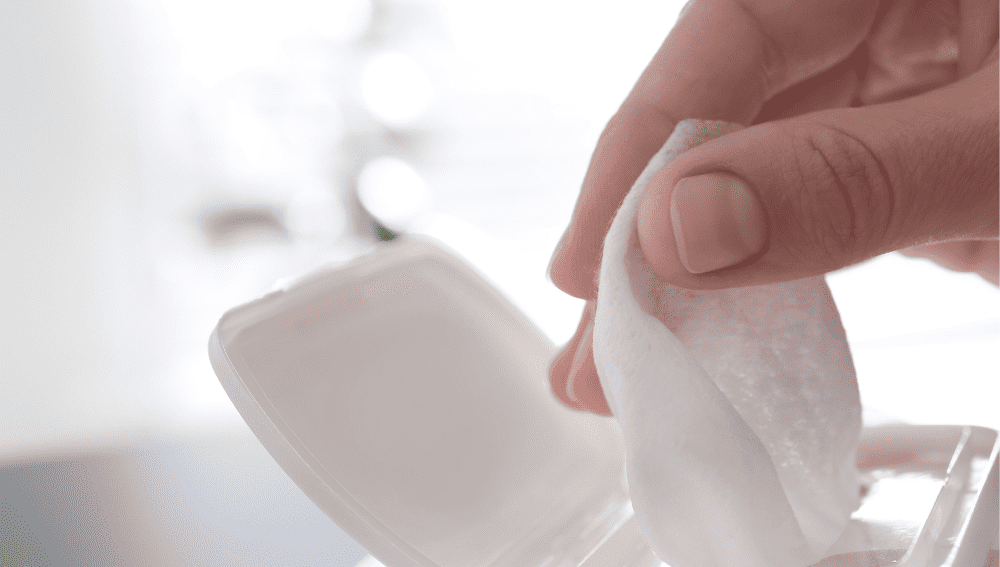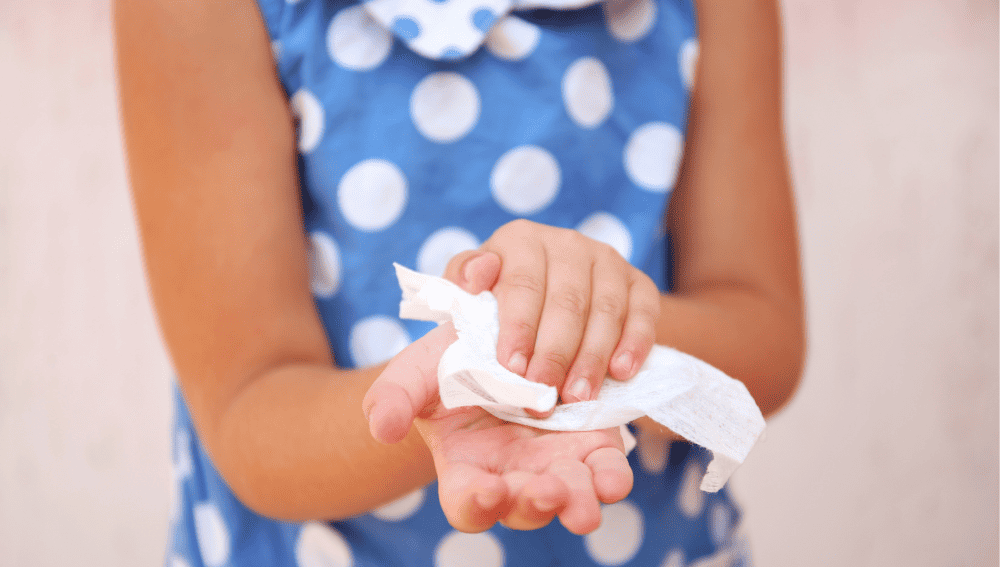Using baby wipes on the face is a common practice among parents with young children. Baby wipes are a convenient and affordable way to clean up messes quickly, and they are gentle on delicate skin.
However, many people wonder whether it is safe to use baby wipes on their own faces. In this article, we will explore the topic of using baby wipes on the face and provide answers to some frequently asked questions.
Understanding Baby Wipes Baby wipes are moistened cloths that are designed to clean up messes quickly and easily.
They are made from a variety of materials, including cotton, polyester, and viscose. Most baby wipes are also infused with a solution that contains water, mild detergents, and other ingredients that help to clean and moisturize the skin.
Baby Wipes and Skin Health While baby wipes are generally safe to use on the skin, they may not be the best choice for everyone. People with sensitive skin or allergies may experience irritation or other adverse reactions when using baby wipes.
Additionally, some baby wipes contain ingredients that can be harmful to the skin, such as alcohol or fragrances. It is important to read the label carefully and choose a baby wipe that is safe for your skin type.
Key Takeaways
- Baby wipes are a convenient and affordable way to clean up messes quickly, but they may not be the best choice for everyone.
- People with sensitive skin or allergies may experience irritation or other adverse reactions when using baby wipes.
- It is important to read the label carefully and choose a baby wipe that is safe for your skin type.
Editorial pick: 7 Multi-Purpose Best Baby Wipe Dispenser 2021
Understanding Baby Wipes
Ingredients in Baby Wipes
Baby wipes are made up of a combination of materials and ingredients, depending on the brand and type of wipe. Most baby wipes contain a mix of water, polyester, and polypropylene, which are used to create the wipe itself.
In addition to these materials, baby wipes also contain a range of other ingredients, such as alcohols, preservatives, and fragrances.
The ingredients list on baby wipes can be confusing, and it’s important to understand what each ingredient is and what its purpose is in the wipe.
Some common ingredients found in baby wipes include sodium benzoate, decyl glucoside, citric acid, and aloe barbadensis leaf extract.
Are Baby Wipes Safe?
The safety of baby wipes has been a topic of debate over the years. Some concerns have been raised about the chemicals in baby wipes, particularly preservatives and fragrances. However, the vast majority of baby wipes on the market are safe for use on babies and adults.
That being said, it’s important to read the ingredients list and choose wipes that are free from harsh chemicals and fragrances if you have sensitive skin or are concerned about potential irritants.
Natural Baby Wipes Vs Regular Baby Wipes
Natural baby wipes are becoming increasingly popular, as they are made from plant-based materials and are free from harsh chemicals and fragrances. Some common materials used in natural baby wipes include bamboo, cotton, and aloe vera.
Regular baby wipes, on the other hand, are typically made from a mix of materials and may contain a range of chemicals and fragrances.
While both types of wipes are safe for use on babies and adults, natural baby wipes may be a better choice for those with sensitive skin or who are concerned about potential irritants.
In summary, baby wipes are a convenient and effective way to clean the skin, but it’s important to choose wipes that are free from harsh chemicals and fragrances if you have sensitive skin or are concerned about potential irritants.
Natural baby wipes may be a better choice for those who want a more eco-friendly and gentle option.
Baby Wipes and Skin Health
Baby Wipes on Sensitive Skin
Baby wipes are a convenient and quick way to clean your face, but are they safe for sensitive skin? Many baby wipes are marketed as hypoallergenic and gentle on skin, making them seem like a good choice for those with sensitive skin.
However, it’s important to note that not all baby wipes are created equal, and some may contain ingredients that can irritate sensitive skin.
When choosing baby wipes for sensitive skin, it’s important to look for products that are labeled as hypoallergenic and free from harsh chemicals.
Some common ingredients to avoid include phenoxyethanol and methylisothiazolinone, which can cause skin irritation and allergic reactions in some people.
Potential Irritation and Breakouts
While baby wipes may be gentle on some skin types, they can also cause irritation and breakouts for others.
This is because baby wipes can leave behind residue that clogs pores and leads to breakouts. It’s important to thoroughly rinse your face after using baby wipes to ensure that all residue is removed.
In addition, using baby wipes too frequently can also lead to skin irritation and dryness. If you’re using baby wipes to remove makeup or dirt from your face, it’s important to follow up with a gentle moisturizer to keep your skin hydrated and healthy.
Overall, baby wipes can be a convenient and effective way to clean your face, but it’s important to choose the right product for your skin type and to use them in moderation to avoid potential irritation and breakouts.
Baby Wipes as Facial Cleansers
When it comes to cleansing the face, there are a variety of options available. One option that some people may consider is using baby wipes as a facial cleanser. While baby wipes can be convenient and gentle, it is important to understand their limitations and potential drawbacks.
Removing Makeup with Baby Wipes
One of the most common uses for baby wipes as a facial cleanser is for removing makeup. Baby wipes can be effective at removing light makeup, but they may struggle with heavier or waterproof products.
Additionally, some baby wipes may contain fragrances or other ingredients that could irritate the skin or eyes.
If using baby wipes to remove makeup, it is important to be gentle and avoid scrubbing too hard. This can cause irritation and redness, particularly around the delicate eye area.
After using a baby wipe to remove makeup, it is a good idea to follow up with a gentle cleanser or rinse the face with water to remove any residue.
Regular Facial Cleansing with Baby Wipes
While baby wipes can be a convenient option for removing makeup, they may not be the best choice for regular facial cleansing.
Baby wipes are designed to be gentle and may not be effective at removing dirt, oil, and other impurities from the skin. Additionally, using baby wipes too frequently could lead to dryness or irritation.
If using baby wipes for regular facial cleansing, it is important to choose a product that is gentle and fragrance-free. It is also a good idea to follow up with a moisturizer to help keep the skin hydrated. However, for a deep clean, using a face wash or other cleanser may be a better option.
In conclusion, while baby wipes can be a convenient and gentle option for removing light makeup, they may not be the best choice for regular facial cleansing.
It is important to consider the potential drawbacks and limitations of using baby wipes as a facial cleanser and to choose a product that is appropriate for your skincare routine and needs.
Environmental Impact of Baby Wipes
Biodegradable Baby Wipes
Biodegradable baby wipes are made of materials that can decompose naturally without causing harm to the environment. They are usually made of plant-based fibers, such as bamboo or cotton, and do not contain harsh chemicals that can be harmful to the skin or environment.
Biodegradable baby wipes are a better option for those who are environmentally conscious and want to reduce their carbon footprint.
Disposal of Baby Wipes
Baby wipes should never be flushed down the toilet as they can cause blockages in the sewer system. Instead, they should be disposed of in the trash.
However, it is important to note that even biodegradable baby wipes can take a long time to decompose in landfills, and they can still contribute to environmental pollution.
When disposing of baby wipes, it is important to consider the impact they may have on the environment. Some baby wipes contain fragrances, soap, chlorine, parabens, and other harsh chemicals that can be harmful to the environment.
These chemicals can seep into the soil and waterways, causing damage to wildlife and their habitats.
Using cloth wipes instead of disposable baby wipes can significantly reduce the environmental impact of baby wipes. Cloth wipes can be washed and reused, reducing the amount of waste that ends up in landfills. They are also a more cost-effective option in the long run.
In conclusion, while biodegradable baby wipes are a better option than traditional non-biodegradable wipes, they still have an impact on the environment.
It is important to consider the materials used in baby wipes, as well as their disposal method, when making choices that can reduce our impact on the environment.
Alternatives to Baby Wipes
When it comes to personal care, many people have turned to baby wipes as a convenient option for cleaning their face. However, some individuals may be concerned about the safety and effectiveness of using baby wipes on their face.
Fortunately, there are several alternatives to baby wipes that can provide a refreshing and effective cleansing experience.
Using Water and Soap
One of the simplest and most effective alternatives to baby wipes is using water and soap. This method can help to remove dirt, oil, and other impurities from the skin without the use of potentially harmful chemicals.
To use this method, simply wet your face with warm water and apply a mild, fragrance-free soap. Gently massage the soap onto your face, focusing on areas that are prone to oiliness or breakouts. Rinse your face thoroughly with warm water and pat dry with a clean towel.
Choosing Hypoallergenic Wipes
For those who prefer the convenience of wipes, there are several hypoallergenic options available that are specifically designed for use on sensitive skin.
These wipes are typically free from harmful chemicals such as phthalates, formaldehyde, and alcohol, which can be harsh and irritating to the skin. Some popular brands of hypoallergenic wipes include Olay, Burt’s Bees, and Seventh Generation.
When choosing wipes, be sure to read the label carefully to ensure that they are safe and appropriate for use on the face.
In conclusion, while baby wipes may be a convenient option for cleaning the face, there are several alternatives available that can provide a safe and effective cleansing experience.
By using water and soap or choosing hypoallergenic wipes, individuals can maintain healthy, refreshed skin without the use of harmful chemicals or pore-clogging ingredients.
Related Posts:
Frequently Asked Questions
Can baby wipes cause irritation on the face?
Yes, some baby wipes may cause irritation on the face, especially if they contain harsh chemicals or fragrances. It is important to choose baby wipes that are specifically formulated for sensitive skin or use face wipes that are designed for facial use.
What are the best face wipes for sensitive skin?
The best face wipes for sensitive skin are those that are free from harsh chemicals and fragrances. Look for wipes that are hypoallergenic, fragrance-free, and formulated for sensitive skin.
Are baby wipes safe for removing makeup on the face?
Yes, baby wipes can be used for removing makeup on the face, but it is important to choose wipes that are gentle and do not contain harsh chemicals. It is also recommended to follow up with a cleanser to ensure all makeup is removed.
Can using baby wipes on the face cause acne?
Using baby wipes on the face may not directly cause acne, but it can contribute to clogged pores if not used properly. It is important to choose wipes that are gentle and do not contain oils or other ingredients that can clog pores.
What are the alternatives to using face wipes?
Alternatives to using face wipes include using a gentle cleanser and water, micellar water, or reusable makeup remover pads. These options are more eco-friendly and can be gentler on the skin.
Are there any harmful chemicals in baby wipes that can damage the face?
Some baby wipes may contain harmful chemicals such as parabens, phthalates, and fragrances that can irritate the skin and cause damage over time. It is important to choose wipes that are free from these ingredients and are formulated for sensitive skin.

Iesha is a loving mother of 2 beautiful children. She’s an active parent who enjoys indoor and outdoor adventures with her family. Her mission is to share practical and realistic parenting advice to help the parenting community becoming stronger.



